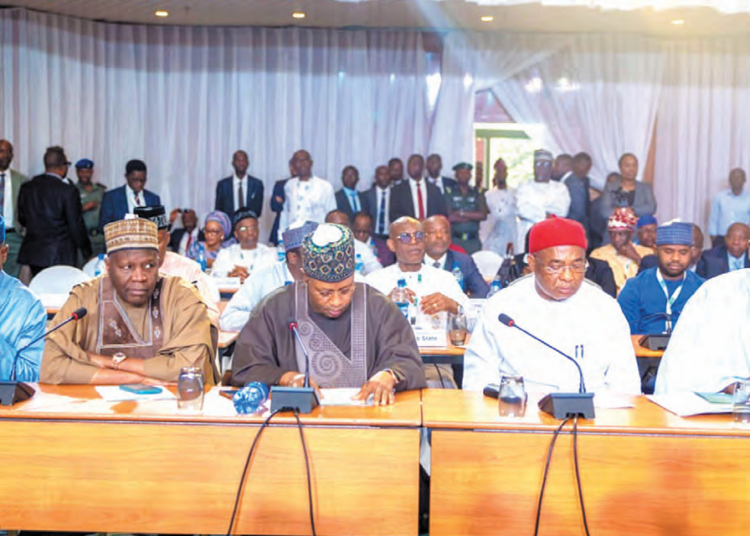The federal government has formally commenced a comprehensive review of Nigeria’s revenue allocation formula.
The move is expected to adjust the distribution of federally collected revenue among the three tiers of government to reflect present-day socio-economic realities better.
Chairman of the Revenue Mobilisation Allocation and Fiscal Commission (RMAFC), Mohammed Bello Shehu, announced this at a press briefing held at the Yar’Adua Centre in Abuja on Monday, where he outlined the principles and objectives guiding the process.
According to indications from the commission, the proposed new formula would increase the percentage of federal revenue accruing to states of the federation.
Sources familiar with the discussions revealed that the government is considering raising state allocations to between 30 and 40 per cent, a significant improvement from the current arrangement.
Presently, the formula allocates 52.68 per cent to the federal government, 26.72 per cent to states, and 20.60 per cent to local governments – a structure in operation since 1992.
Stakeholders who attended the briefing emphasised that additional revenue to states should be strategically deployed, particularly in infrastructure development such as electricity provision, road networks, and healthcare delivery.
The federal government had already ceded 5 per cent of its share of tax revenue to states, in accordance with provisions in the recently signed national tax reforms.
Speakers at the forum, however, cautioned that greater allocations must go hand in hand with strengthened accountability frameworks at the state and local government levels, to prevent leakages and ensure citizens benefit directly from increased revenue flows.
RMAFC chairman Shehu explained that the central aim of the review was to produce a fair, just, and equitable sharing formula that aligns with the evolving responsibilities, fiscal needs, and service delivery obligations of the federal, state, and local governments as defined by the 1999 Constitution.
He added that the commission was determined to balance developmental disparities across regions while promoting fiscal efficiency.
“Let me state clearly that this review will be inclusive, data-driven, and transparent. It will involve broad-based consultations with critical stakeholders, including the Presidency, National Assembly, State Governors, the Association of Local Governments of Nigeria (ALGON), the Judiciary, Ministries, Departments and Agencies (MDAs), civil society organisations, traditional rulers, the organised private sector, and international development partners,” Shehu said.
He promised that the commission would deploy cutting-edge research tools, empirical data, and lessons from international best practices in shaping the revised formula.
Nigeria’s revenue allocation framework has been a recurring source of contention among the three tiers of government. The last major review was conducted in 1992 under military rule. However, successive administrations have issued executive orders since 2002 to tweak the arrangement in line with emerging fiscal and socio-economic realities.
Despite these modifications, calls for a holistic review have persisted, particularly from state governors who argue that the bulk of service delivery responsibilities, such as education, health, housing, and rural infrastructure, fall within the purview of sub-national governments.
Salary increase for president, governors, ministers, living wage for workers.
As part of the wider reform exercise, the commission disclosed that it would also assess the remuneration framework for political officeholders and public servants with a view to introducing upward adjustments.
This includes salaries of the president, governors, ministers, and directors-general, among others.
“We will do justice to Nigerian workers. We have to pay individual workers a living wage. Development must be inclusive, and it cannot be achieved if the majority of our workers are underpaid,” Shehu explained.
He stressed the importance of repositioning the local government system as the true centre of grassroots development.
“We have to go back to the era where the centre of development becomes the local government. The real development should be back in the local government area,” he stated.
The ongoing review, according to analysts, could reshape Nigeria’s fiscal federalism and bring greater balance to governance.
If implemented faithfully, it could ease financial pressure on states and local governments, enhance their capacity to deliver public services, and reduce over-centralisation of resources at the federal level, a long-standing issue in Nigeria’s federal structure.





